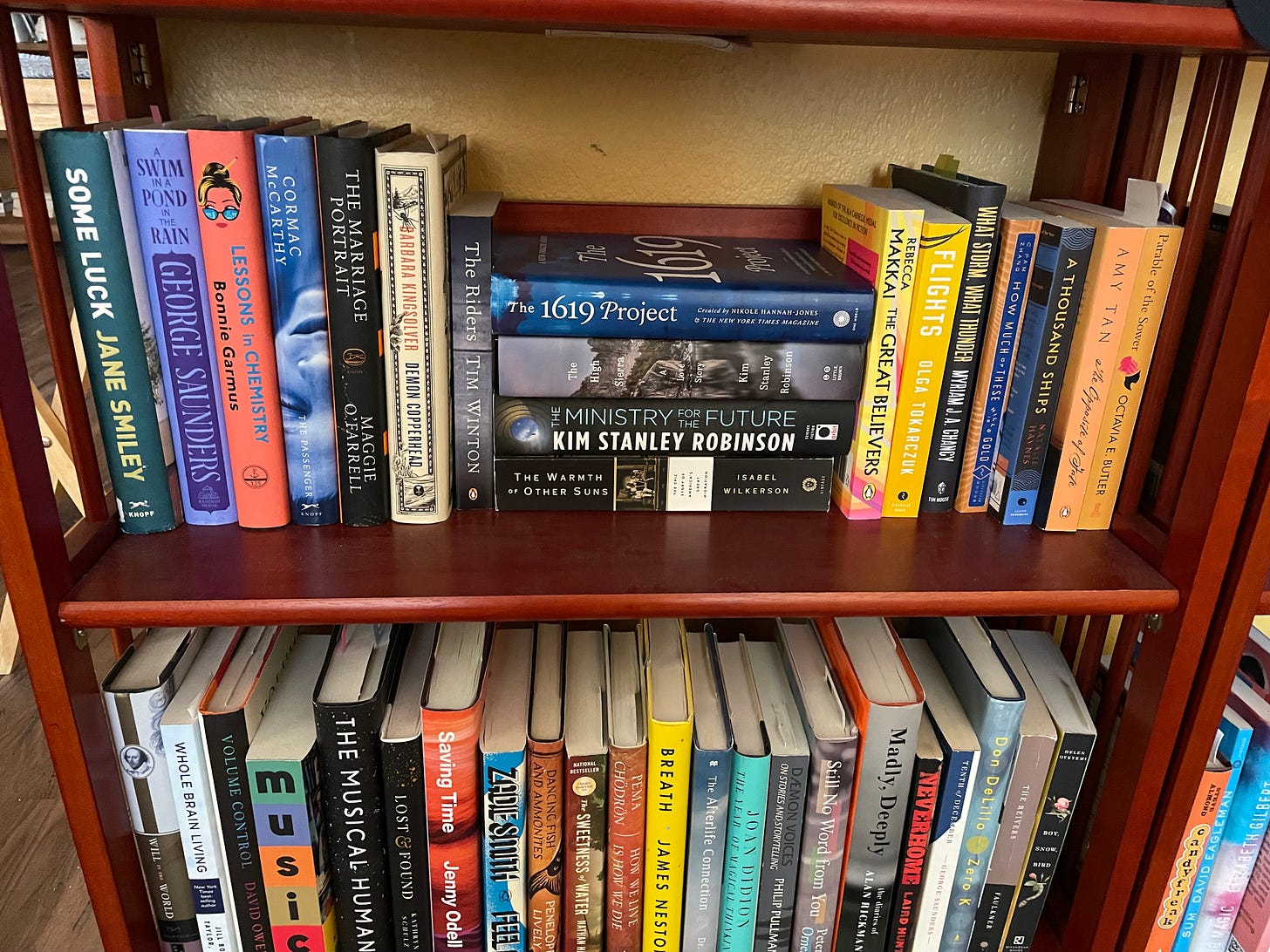Big Fat books (those over 500 pages), especially books that are maybe hard to read or are required reading in a classroom, are often referred to as “door-stoppers.” Lately I’ve run into comments about other ways they can be useful, like what Richard Armitage said in The Guardian newsletter, “Bookmarks,” about the book that changed him as a teenager. “I read The Lord of the Rings when I was 13. I had a single edition of all three books which I used to stand on to reach the top shelf in my wardrobe.”
I read or heard somewhere once that the best thing about James Joyce’s Ulysses (1056 pages) is that you can carry it on a plane with a bookmark halfway through to make it look like you’re smart, although having “read”* Ulysses in college, I can tell you that reading Ulysses, really reading it, indicates persistence more than intelligence, at least in my experience. And I know that some people love stream-of-consciousness writing. I’m not one of them. It would be smarter to carry the less-hefty Dubliners (118 pages) and actually read it and enjoy it. I still carry images in my head from those stories.
Dickens wrote Big Fat books, and so did many of the Victorian novelists. I took a class in Victorian Lit in college (only because there were no other classes scheduled at a time when I could attend and it was my last semester and I needed the credits to graduate) and knew I was in trouble when I was 500 pages behind in my reading of Vanity Fair (720 pages). Here’s how Vic Lit has been valuable in my everyday life: working crossword puzzles. Also as weights when I’ve made a paper collage and want to encourage it to dry flat.
I almost read Anna Karenina (848 pages) once. I started to read it, and because I was prone to reading more than one book at a time, I guess I just lost track and didn’t think about it again until I was moving into a different house. The movers lifted the bed, and there was Anna Karenina, face down and spread wide at about halfway through. “Hmm,” I thought. “So that’s where I left it.” I must have enjoyed it enough to read to that point but not enough to continue. I love Dostoevsky, especially Crime and Punishment (720 pages), and I’m sure that’s what led me to try Anna Karenina, broaden my reading of the Russians. [Just now as I was looking up the page count, I saw this blurb from a young author of popular fiction: “I finally finished Anna Karenina recently . . . I think I can say without controversy that it’s a great book.” My Snark Persona was so relieved to hear that she had put her stamp of approval on this classic.]
When I am in my usual love-to-read state, I get excited about a Big Fat Book. I love dropping into a different world and hanging out there for awhile. And when I’m done, I can use that book as a bookend, especially good when I stack it on top of another two or three Big Fat Books. The best book-end-door-stopper in one volume: Shakespeare’s collected plays and poetry:
Do you read Big Fat Books? Which ones have you loved or hated?
Do you have other ways of using books besides reading them?
*The truth is that I “read at” Ulysses, skimming most of it so that I wouldn’t be totally lost in class discussions. My attempt at reading it led to long stretches of thinking about things like what to cook for dinner that night while my eyes kept moving left to right, left to right.





I hoping for some distant time when I can sit down with a big book and spend a whole afternoon with it. Right now my attention span is too short.
I tend not to read many Big, Fat Books, but I loved Anna Karenina. I've tried The Idiot twice and disappointed myself by abandoning it within 30 pages (though I loved C&P). Same with Our Mutual Friend (though I loved David Copperfield). Maybe the issue with me is how slowly the book unfolds. Meanwhile, Sanborn gave me a BFB for my birthday: The Museum of Abandoned Secrets by Oksana Zabuzhko. Anybody know this one? I haven't started it yet -- am reading Demon Copperhead for a book club. (Unfolds quickly!)